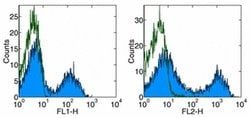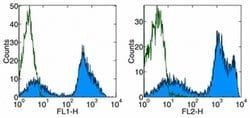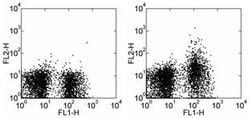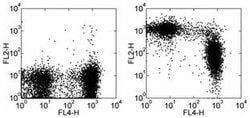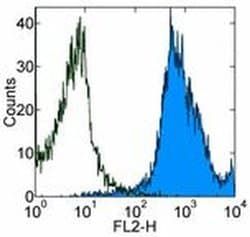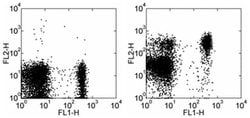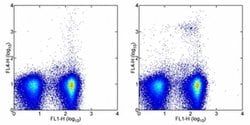7069065
CD197 (CCR7) Monoclonal Antibody (4B12), Biotin, eBioscience™, Invitrogen™
Rat Monoclonal Antibody
Manufacturer: Fischer Scientific
The price for this product is unavailable. Please request a quote
Antigen
CD197 (CCR7)
Concentration
0.5 mg/mL
Classification
Monoclonal
Form
Liquid
Regulatory Status
RUO
Gene Accession No.
P47774
Gene Symbols
Ccr7
Primary or Secondary
Primary
Content And Storage
4° C, store in dark, DO NOT FREEZE!
Gene
Ccr7
Clone
4B12
Applications
Flow Cytometry
Conjugate
Biotin
Host Species
Rat
Target Species
Mouse
Gene ID (Entrez)
12775
Isotype
IgG2a κ
Purification Method
Affinity chromatography
Product Type
Antibody
Description
- Description: The 4B12 monoclonal antibody reacts with mouse CCR7, also known as EBI-1 and CD197
- CCR7 is a chemokine receptor for the chemokines CCL19 (CKβ11, ELC, MIP3β, Scya19, Exodus-3) and CCL21 (CKβ9, SLC, MIP2β, Scya21, Exodus-2)
- In recent years, the role of chemokines in directing the migration of lymphocytes has been well-characterized
- One of the most important mediators of homeostatic trafficking of naive T cells to secondary lymphoid organs (SLO) is the chemokine receptor CCR7
- Binding of its ligands, CCL19 and CCL21, mediates the trans endothelial migration of T cells across high endothelial venules into SLO
- It has also been demonstrated that CCR7 plays a role in the localization of dendritic cells and B cells during an immune response
- CCR7 is a chemokine receptor for the chemokines CCL19 (CKβ11, ELC, MIP3β, Scya19, Exodus-3) and CCL21 (CKβ9, SLC, MIP2β, Scya21, Exodus-2)
- In addition to its significant role in the chemotaxis of lymphocytes, human CCR7 has also been recognized as a marker for a distinct subset of memory T cells, the central memory (TCM) population
- These cells are characterized by the expression of CCR7 and CD62L and reside within peripheral lymphoid organs
- CCR7 also plays a role in thymocyte development and its deficiency leads to disturbed thymic architecture, aberrant T cell development, and limited thymocyte expansion
- CCR7 is a member of the G protein coupled receptor family, which is a subfamily of chemokines
- CCR7 was identified to be induced by the Epstein Barr virus (EBV), and is thought to be a mediator of EBV effects on B lymphocytes
- CCR7 has been reported to be expressed in blood, bone marrow, lymph node, and intestine
- CCR7 is particularly expressed in lymphoid tissues and in activated B and T lymphocytes and has been shown to control the migration of memory T cells to inflamed tissues, as well as stimulate dendritic cell maturation
- The chemokine (C-C motif) ligand 19 (CCL19/ECL) has been reported to be a specific ligand of this receptor
- ESTs have been isolated from blood, embryo, lymph node, and thymus libraries
- Receptors for the C - C chemokine family include CCR 1, CCR 2A, CCR 3, CCR 4, CCR 5 and the Duffy blood group antigen
- The C-C receptors are important in the function of T cell chemotaxis and migration of phagocytic cells to sites of inflammation.
Compare Similar Items
Show Difference
Antigen: CD197 (CCR7)
Concentration: 0.5 mg/mL
Classification: Monoclonal
Form: Liquid
Regulatory Status: RUO
Gene Accession No.: P47774
Gene Symbols: Ccr7
Primary or Secondary: Primary
Content And Storage: 4° C, store in dark, DO NOT FREEZE!
Gene: Ccr7
Clone: 4B12
Applications: Flow Cytometry
Conjugate: Biotin
Host Species: Rat
Target Species: Mouse
Gene ID (Entrez): 12775
Isotype: IgG2a κ
Purification Method: Affinity chromatography
Product Type: Antibody
Antigen:
CD197 (CCR7)
Concentration:
0.5 mg/mL
Classification:
Monoclonal
Form:
Liquid
Regulatory Status:
RUO
Gene Accession No.:
P47774
Gene Symbols:
Ccr7
Primary or Secondary:
Primary
Content And Storage:
4° C, store in dark, DO NOT FREEZE!
Gene:
Ccr7
Clone:
4B12
Applications:
Flow Cytometry
Conjugate:
Biotin
Host Species:
Rat
Target Species:
Mouse
Gene ID (Entrez):
12775
Isotype:
IgG2a κ
Purification Method:
Affinity chromatography
Product Type:
Antibody
Antigen: CD317 (BST2, PDCA-1)
Concentration: 0.5 mg/mL
Classification: Monoclonal
Form: Liquid
Regulatory Status: RUO
Gene Accession No.: Q8R2Q8
Gene Symbols: Bst2
Primary or Secondary: Primary
Content And Storage: 4° C, store in dark, DO NOT FREEZE!
Gene: Bst2
Clone: eBio927
Applications: Flow Cytometry
Conjugate: Biotin
Host Species: Rat
Target Species: Mouse
Gene ID (Entrez): 69550
Isotype: IgG2b κ
Purification Method: Affinity chromatography
Product Type: Antibody
Antigen:
CD317 (BST2, PDCA-1)
Concentration:
0.5 mg/mL
Classification:
Monoclonal
Form:
Liquid
Regulatory Status:
RUO
Gene Accession No.:
Q8R2Q8
Gene Symbols:
Bst2
Primary or Secondary:
Primary
Content And Storage:
4° C, store in dark, DO NOT FREEZE!
Gene:
Bst2
Clone:
eBio927
Applications:
Flow Cytometry
Conjugate:
Biotin
Host Species:
Rat
Target Species:
Mouse
Gene ID (Entrez):
69550
Isotype:
IgG2b κ
Purification Method:
Affinity chromatography
Product Type:
Antibody
Antigen: __
Concentration: 0.5 mg/mL
Classification: Monoclonal
Form: Liquid
Regulatory Status: RUO
Gene Accession No.: P19022
Gene Symbols: CDH2
Primary or Secondary: Primary
Content And Storage: 4° C, store in dark, DO NOT FREEZE!
Gene: CDH2
Clone: 8C11
Applications: Flow Cytometry, Immunohistochemistry (Paraffin)
Conjugate: Biotin
Host Species: Mouse
Target Species: Human
Gene ID (Entrez): 1000
Isotype: IgG1 κ
Purification Method: Affinity chromatography
Product Type: Antibody
Antigen:
__
Concentration:
0.5 mg/mL
Classification:
Monoclonal
Form:
Liquid
Regulatory Status:
RUO
Gene Accession No.:
P19022
Gene Symbols:
CDH2
Primary or Secondary:
Primary
Content And Storage:
4° C, store in dark, DO NOT FREEZE!
Gene:
CDH2
Clone:
8C11
Applications:
Flow Cytometry, Immunohistochemistry (Paraffin)
Conjugate:
Biotin
Host Species:
Mouse
Target Species:
Human
Gene ID (Entrez):
1000
Isotype:
IgG1 κ
Purification Method:
Affinity chromatography
Product Type:
Antibody
Antigen: Rat IgG2b kappa
Concentration: __
Classification: __
Form: Liquid
Regulatory Status: RUO
Gene Accession No.: __
Gene Symbols: __
Primary or Secondary: Isotype Control (Primary)
Content And Storage: 4° C, store in dark, DO NOT FREEZE!
Gene: __
Clone: eB149/10H5
Applications: __
Conjugate: Biotin
Host Species: Rat
Target Species: __
Gene ID (Entrez): __
Isotype: IgG2b κ
Purification Method: Affinity chromatography
Product Type: __
Antigen:
Rat IgG2b kappa
Concentration:
__
Classification:
__
Form:
Liquid
Regulatory Status:
RUO
Gene Accession No.:
__
Gene Symbols:
__
Primary or Secondary:
Isotype Control (Primary)
Content And Storage:
4° C, store in dark, DO NOT FREEZE!
Gene:
__
Clone:
eB149/10H5
Applications:
__
Conjugate:
Biotin
Host Species:
Rat
Target Species:
__
Gene ID (Entrez):
__
Isotype:
IgG2b κ
Purification Method:
Affinity chromatography
Product Type:
__

